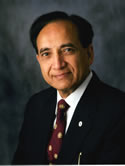Salvage re-irradiation for recurrent head and neck cancer Journal Article
| Authors: | Lee, N.; Chan, K.; Bekelman, J. E.; Zhung, J.; Mechalakos, J.; Narayana, A.; Wolden, S.; Venkatraman, E. S.; Pfister, D.; Kraus, D.; Shah, J.; Zelefsky, M. J. |
| Article Title: | Salvage re-irradiation for recurrent head and neck cancer |
| Abstract: | Purpose: To present a retrospective review of treatment outcomes for recurrent head and neck (HN) cancer patients treated with re-irradiation (re-RT) at a single medical center. Methods and Materials: From July 1996-September 2005, 105 patients with recurrent HN cancer underwent re-RT at our institution. Sites included were: the neck (n = 21), nasopharynx (n = 21), paranasal sinus (n = 18), oropharynx (n = 16), oral cavity (n = 9), larynx (n = 10), parotid (n = 6), and hypopharynx (n = 4). The median prior RT dose was 62 Gy. Seventy-five patients received chemotherapy with their re-RT (platinum-based in the majority of cases). The median re-RT dose was 59.4 Gy. In 74 (70%), re-RT utilized intensity-modulated radiation therapy (IMRT). Results: With a median follow-up of 35 months, 18 patients were alive with no evidence of disease. The 2-year loco-regional progression-free survival (LRPFS) and overall survival rates were 42% and 37%, respectively. Patients who underwent IMRT, compared to those who did not, had a better 2-year LRPF (52% vs. 20%, p < 0.001). On multivariate analysis, non-nasopharynx and non-IMRT were associated with an increased risk of loco-regional (LR) failure. Patients with LR progression-free disease had better 2-year overall survival vs. those with LR failure (56% vs. 21%, p < 0.001). Acute and late Grade 3-4 toxicities were reported in 23% and 15% of patients. Severe Grade 3-4 late complications were observed in 12 patients, with a median time to development of 6 months after re-RT. Conclusions: Based on our data, achieving LR control is crucial for improved overall survival in this patient population. The use of IMRT predicted better LR tumor control. Future aggressive efforts in maximizing tumor control in the recurrent setting, including dose escalation with IMRT and improved chemotherapy, are warranted. © 2007 Elsevier Inc. All rights reserved. |
| Keywords: | adult; cancer survival; treatment outcome; aged; aged, 80 and over; disease-free survival; middle aged; survival analysis; survival rate; treatment failure; major clinical study; overall survival; intensity modulated radiation therapy; salvage therapy; cisplatin; fluorouracil; capecitabine; gemcitabine; paclitaxel; radiation dose; chemotherapy; recurrent cancer; follow up; carboplatin; neoplasm recurrence, local; radiotherapy; prevalence; risk factors; oncology; retrospective study; prediction; risk assessment; docetaxel; head and neck cancer; imrt; head and neck neoplasms; dosimetry; oropharynx cancer; mitomycin c; multivariate analysis; new york; nasopharynx cancer; larynx cancer; head and neck; paranasal sinus cancer; mouth cancer; retreatment; diseases; hypopharynx cancer; recurrent; reirradiation; neck cancer; intensity modulated radiation therapy (imrt); re-irradiation; parotid gland cancer; loco regional progression-free survival (lrpfs) |
| Journal Title: | International Journal of Radiation Oncology, Biology, Physics |
| Volume: | 68 |
| Issue: | 3 |
| ISSN: | 0360-3016 |
| Publisher: | Elsevier Inc. |
| Date Published: | 2007-07-01 |
| Start Page: | 731 |
| End Page: | 740 |
| Language: | English |
| DOI: | 10.1016/j.ijrobp.2006.12.055 |
| PUBMED: | 17379449 |
| PROVIDER: | scopus |
| DOI/URL: | |
| Notes: | --- - "Cited By (since 1996): 46" - "Export Date: 17 November 2011" - "CODEN: IOBPD" - "Source: Scopus" |
Altmetric
Citation Impact
BMJ Impact Analytics
MSK Authors
Related MSK Work











